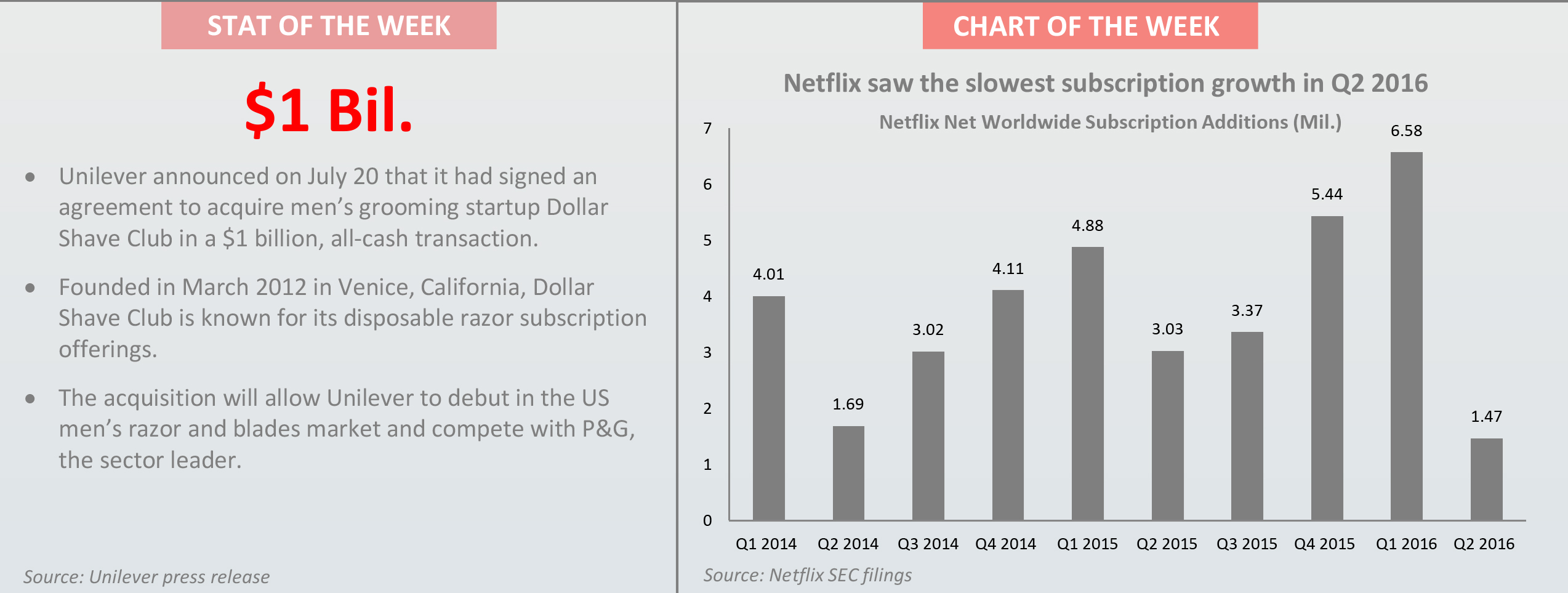
FROM THE DESK OF DEBORAH WEINSWIG
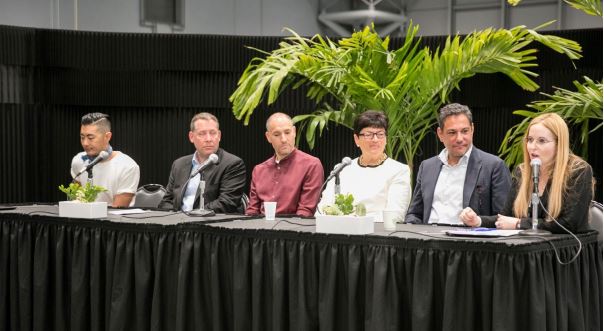
This week, Fung Global Retail & Technology co-hosted a “Breakfast with The Disruptors” event with First Insight at the PROJECT New York conference. The event featured a panel discussion covering topics such as the millennial market, the omni-channel store shopper and the rise of customization, data analytics, retailtainment and the future of the in-store experience, and retailers in the media.
PROJECT is held twice annually in New York, in January and July, and offers a buying experience for the contemporary menswear market. The panel took place at P1VOT, a new show-floor area highlighting innovative, tech-based business solutions for designers and retailers. Fung Global Retail & Technology moderated the panel discussion, which included representatives from First Insight, John Varvatos, Mashable, Things Remembered, Resonance Companies, Body Labs and Tommy John.
The first part of the discussion centered on the importance of millennials as a demographic. One panelist suggested that the buzz regarding millennials may just be about patterns of behavior that we all go through as we grow up and into adulthood—and that these are not specific to any one generation, but life stages common to all. Another panelist suggested that we should focus our attention on Gen Z, because that generation influences more than $600 billion of commerce a year and is notable for being independent, discrete, genderless, empowered, not brand loyal and into cool brands.
The second part of the discussion centered on how successful brands use data analytics to understand and deliver customized and personalized products. One panelist spoke about microcommunities and microsegmentation, commenting that brands today have so much information about consumers that they can use it to target specific customers. For example, cart abandonment provides a wealth of information on what sizes consumers are considering buying, as well as their ages, where they live and other details. Another panelist stressed the need to understand the data, capture the insights the data point to and not become distracted by all of the tech options in the industry.
The CEO of co-host First Insight commented that data analytics are only one piece of the equation, and that retailers have to be true to the consumer in terms of balancing data with their intuition when they make business decisions. First Insight provides clients with a platform for testing new products and uses metadata to help retailers understand what will resonate with their customers.
When asked how far is too far in proactively reaching out to customers, panelists commented that we live in a personalization space and that, therefore, retailers need to ensure that customers receive messages that are personalized for them. There is a fine line between catering to customers and showing knowledge of exactly what they purchased. Customers see the value in sharing their information if it is used in a way that is personalized for them. For example, retailer John Varvatos sends out e-mail communications and then tracks how many customers visit the store the following day in order to assess which messaging best resonates with customers. One panelist specifically advised the audience to be careful to engage customers rather than push them.
The final question put to the panelists was, “What technologies are you focusing on the most?” Reponses included personalization and microsegmentation; having one view of the customer and one view of the inventory system; operational decision management, fraud control and real-time decision-making capabilities; customer segmentation, testing products and augmented reality in the store; and wearable technology.
We at Fung Global Retail & Technology were pleased to have the opportunity to co-host this informative event with First Insight and appreciate the views and insights all the panelists shared. We look forward to hosting and reporting on more “Breakfast with The Disruptors” events in the near future!
US RETAIL EARNINGS

Source: Company reports *originally reported in Euro
US RETAIL & TECH HEADLINES
 Making Sense of Pricing on Amazon Fashion Items
(July 20) Women’s Wear Daily
Making Sense of Pricing on Amazon Fashion Items
(July 20) Women’s Wear Daily
- Amazon’s confusing pricing approach makes it difficult to understand its algorithms, discounting volumes and the pact of third-party sellers. The e-commerce giant adjusts prices often—sometimes several times a day—and recently eliminated “list prices.”
- A new report finds that for products under $50, Amazon and third-party sellers tend to offer similar prices. However, as prices climb, Amazon’s pricing is “more aggressive.” Less than half of products sold on Amazon are from third-party sellers. Compared to fashion brands, Amazon’s wholesale inventory is discounted more steeply.
 Google Cuts Its Giant Electricity Bill with DeepMind-Powered AI
(July 19) Bloomberg
Google Cuts Its Giant Electricity Bill with DeepMind-Powered AI
(July 19) Bloomberg
- Google is using artificial intelligence (AI) technology from DeepMind to save on the power consumed by its data centers. The AI system manipulates computer servers and related equipment—such as cooling systems—to reduce energy consumption, cutting power usage by several percentage points.
- This reduction represents a 15% improvement in power usage efficiency. Saving just a few percentage points of electricity usage could translate into hundreds of millions of dollars in savings for Google over multiple years.
 How Ford Is Marketing the Fusion with Fashion Partnerships
(July 20) Glossy
How Ford Is Marketing the Fusion with Fashion Partnerships
(July 20) Glossy
- After announcing in May that it would be seeking partnerships outside the auto industry, Ford is getting involved in sustainable fashion to promote the new Ford Fusion. The company launched Fusion Labs in June, partnering with denim brand 69 and fashion label RTA to create jeans embroidered with custom Ford Fusion patches and screen-printed, eco-friendly tote bags.
- The 2017 Fusion is made with sustainable materials, including “upcycled” denim materials from 69 that are being used as insulation in the car’s sound system.
 What’s On Your Phone? Probably Not Your Wallet
(July 15) Fast Company
What’s On Your Phone? Probably Not Your Wallet
(July 15) Fast Company
- MasterCard is the latest financial behemoth to jump into the mobile wallet game, launching a new system that will enable customers of partnered banks and retailers to send and accept money through a mobile phone. Mobile payments represented 30% of all electronic sales in 2015 and sales on mobile phones grew by 53%.
- However, as banks compete against fintech startups, both are missing the mark. The banks figure that since they have the bulk of customers already, they just have to provide them with cool new tools, but they end up missing critical aspects of the new paying experience. This technological conundrum has precipitated the current traffic jam of mobile wallets and payment methods.
EUROPE RETAIL EARNINGS

Source: Company reports
EUROPE RETAIL HEADLINES
 Deliveroo Teams Up with Alcohol Retailers to Deliver Drinks
(July 19) Retailgazette.co.uk
Deliveroo Teams Up with Alcohol Retailers to Deliver Drinks
(July 19) Retailgazette.co.uk
- Alcohol retailers Majestic Wine and Vagabond Wines have signed a deal with London-based food courier Deliveroo to start delivering across the UK. This new service also sees the involvement of craft brewers BrewDog and HonestBrew, and other independent businesses.
- The expansion follows successful trials undertaken in March and comes less than two months after Deliveroo made a deal with dining giant Pizza Express.
 Boots to Expand in South Korea
(July 18) Company press release
Boots to Expand in South Korea
(July 18) Company press release
- On July 18, Walgreens Boots Alliance announced an agreement with South Korea’s leading hypermarket retailer, Emart, to launch a Boots-branded, pharmacy-led health and beauty retail franchise in South Korea.
- The stores will feature an independent pharmacy and will display Boots’s private-label products, “exclusive to Boots” brands and leading South Korean brands. The first stores are expected to open by mid-2017, in locations that include shopping malls, high streets and the outbound areas of Emart hypermarkets.
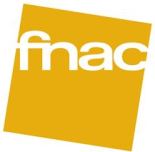 French Regulators Approve Fnac’s Takeover of Darty
(July 18) Financial Times
French Regulators Approve Fnac’s Takeover of Darty
(July 18) Financial Times
- The French competition authority approved Fnac’s £900 million (US$1.2 billion) offer to acquire electronics and appliance retailer Darty. With the acquisition, Fnac aims to achieve bigger scale in order to better compete with the likes of Amazon.
- The approval is subject to the sell-off of six stores from the combined Fnac-Darty network located in the greater Paris region, which, according to the regulator, is needed to address competition concerns.
 Sainsbury’s Unveils Chop Chop One-Hour Delivery Service
(July 18) Supplychaindigital.com
Sainsbury’s Unveils Chop Chop One-Hour Delivery Service
(July 18) Supplychaindigital.com
- Supermarket chain Sainsbury’s has launched Chop Chop in the London borough of Wandsworth. The service is similar to Amazon Prime and shoppers can order up to 20 items to be delivered to them within the hour for a delivery charge of £4.99 (US$6.53).
- Sainsbury’s also recently announced that it has invested in high-tech, liquid-nitrogen delivery trucks, a move set to strengthen its supply chain capabilities ahead of what surely will place extra strain on its network.
 Holland & Barrett Offers Shoppers Locker Collection
(July 18) Internetretailing.net
Holland & Barrett Offers Shoppers Locker Collection
(July 18) Internetretailing.net
- Health retailer Holland & Barrett has responded to a rise in online sales and the growing demand for click-and-collect by offering customers the choice of collecting goods from a locker.
- The company has linked up with InPost UK, a shipping and mailing service, to provide this new option. Emma Mead, Holland & Barrett’s Director of Ecommerce, describes the offering as “the perfect solution” for time-poor consumers who cannot wait for delivery slots.
ASIA TECH HEADLINES
 Alibaba Targets Australia for Global Expansion
(July 19) China Daily
Alibaba Targets Australia for Global Expansion
(July 19) China Daily
- China’s Alibaba is targeting Australia as an important country for its global expansion and announced that it will open its first local office, in Melbourne, later this year.
- Last year, Australia was the fifth-biggest-selling country into China during Alibaba’s global shopping festival, Singles’ Day. The company’s products are currently sold by many Australian retailers, including Blackmores, Woolworths and Chemist Warehouse.
 Japan’s SoftBank Acquires ARM for US$31.4 Billion
(July 18) e27.co
Japan’s SoftBank Acquires ARM for US$31.4 Billion
(July 18) e27.co
- In order to expand its presence in the Internet-of-Things market, Japanese telco giant SoftBank announced it would acquire UK-based chip designer ARM for US$31.4 billion in cash.
- SoftBank is expected to get closer to the everything-connected-to-the-web future with the help of ARM, which designs processor architectures, such as those used in iPhones.
 Thailand’s aCommerce Raised US$10 Million
(July 19) TechinAsia
Thailand’s aCommerce Raised US$10 Million
(July 19) TechinAsia
- Thailand-based startup aCommerce said that it was granted US$10 million by MDI Ventures, the venture capital arm of Indonesia’s state-owned Telkom.
- aCommerce offers comprehensive services such as logistics, fulfillment and marketing to back up aspiring online sellers. The company’s development has coincided with Southeast Asia’s e-commerce boom.
 India’s RentoMojo Receives US$5 Million in Series A Funding
(July 19) e27.co
India’s RentoMojo Receives US$5 Million in Series A Funding
(July 19) e27.co
- Bangalore-based startup RentoMojo has secured a US$5 million series A funding round from Accel and IDG Ventures to strengthen its product and data-driven structure.
- RentoMojo offers online rental services for furniture, appliances, trekking equipment and bikes. The company helps people furnish their homes at minimal cost.
 Singapore’s iFashion Acquires Dressabelle for US$5.5 Million
(July 19) TechinAsia
Singapore’s iFashion Acquires Dressabelle for US$5.5 Million
(July 19) TechinAsia
- Singapore’s iFashion, an online fashion venture platform, has acquired fashion e-store Dressabelle for US$5.5 million in cash and stock. iFashion has previously said that it is exploring a number of acquisitions prior to its planned listing on the Australian Securities Exchange in 2017.
- iFashion assists online entrepreneurs in reaching a wider audience and growing their businesses by providing mentorship, marketing, logistics, warehousing, sales, fulfillment and financial services.
LATAM RETAIL HEADLINES
 Brazil’s Alpargatas Sees Strong Growth at Havaianas
(July 15) WWD.com
Brazil’s Alpargatas Sees Strong Growth at Havaianas
(July 15) WWD.com
- Brazilian footwear and apparel company Alpargatas is expecting a boost in operating earnings of approximately 15% this year as it opens five US stores and boosts European distribution of Havaianas sandals.
- Revenues are expected to increase by 20% this year as Brazilian sales also begin to improve. The company debuted a new line of lower-priced Havaianas to appeal to Brazilians during the recession.
 Samsung Brings Mobile Payments to Brazil in Time for Olympics
(July 14) Bloomberg
Samsung Brings Mobile Payments to Brazil in Time for Olympics
(July 14) Bloomberg
- Samsung is introducing its mobile payments app, Samsung Pay, in Brazil just in time for the Olympic Games, in the hopes that Rio de Janeiro can be a springboard to more markets throughout Latin America. It will be the only mobile payments system available to mobile phone users at the Games.
- In Brazil, there are more active mobile phone lines than there are people, making Rio the perfect place to debut Samsung Pay. Samsung already has a 42% market share in Brazil.
 Goldman Sachs Leads $10 Million Investment in Brazilian Truck Startup CargoX
(July 20) TechCrunch
Goldman Sachs Leads $10 Million Investment in Brazilian Truck Startup CargoX
(July 20) TechCrunch
- Brazilian startup CargoX, described as “Uber for trucks,” announced that it had raised $10 million in series B funding. The company works to connect businesses that need to ship freight with truckers who have excess capacity.
- The Brazilian trucking market is highly fragmented. CargoX helps to bridge the gap by providing a network of trucks and business contacts. The startup has now raised a total of $14 million.
 Fitch: Only Mexican Retailers Escape Region-Wide Challenges
(July 18) 4-Traders.com
Fitch: Only Mexican Retailers Escape Region-Wide Challenges
(July 18) 4-Traders.com
- According to Fitch Ratings, Latin American retailers are struggling in 2016, with the exception of those in Mexico. Mexico is enjoying a steady increase in consumer spending due to consumer credit, low inflation and unemployment, higher remittances, and increased retail space.
- Brazil, Argentina, Chile, Colombia and Peru are all facing difficulties, including political strife, rising macroeconomic issues and weakened consumer confidence.
 Judge Orders WhatsApp Restored in Brazil as Olympics Near
(July 19) Bloomberg
Judge Orders WhatsApp Restored in Brazil as Olympics Near
(July 19) Bloomberg
- The Brazilian government blocked popular messaging app WhatsApp on Tuesday for the third time in seven months, after the company refused to grant access to users’ private communications for an ongoing criminal investigation.
- Brazil’s chief justice, however, ordered that service be restored, as the government’s decision to block the app violated freedom of speech and communication. The company implemented encryption for the messages back in May after a service suspension, in order to increase security.
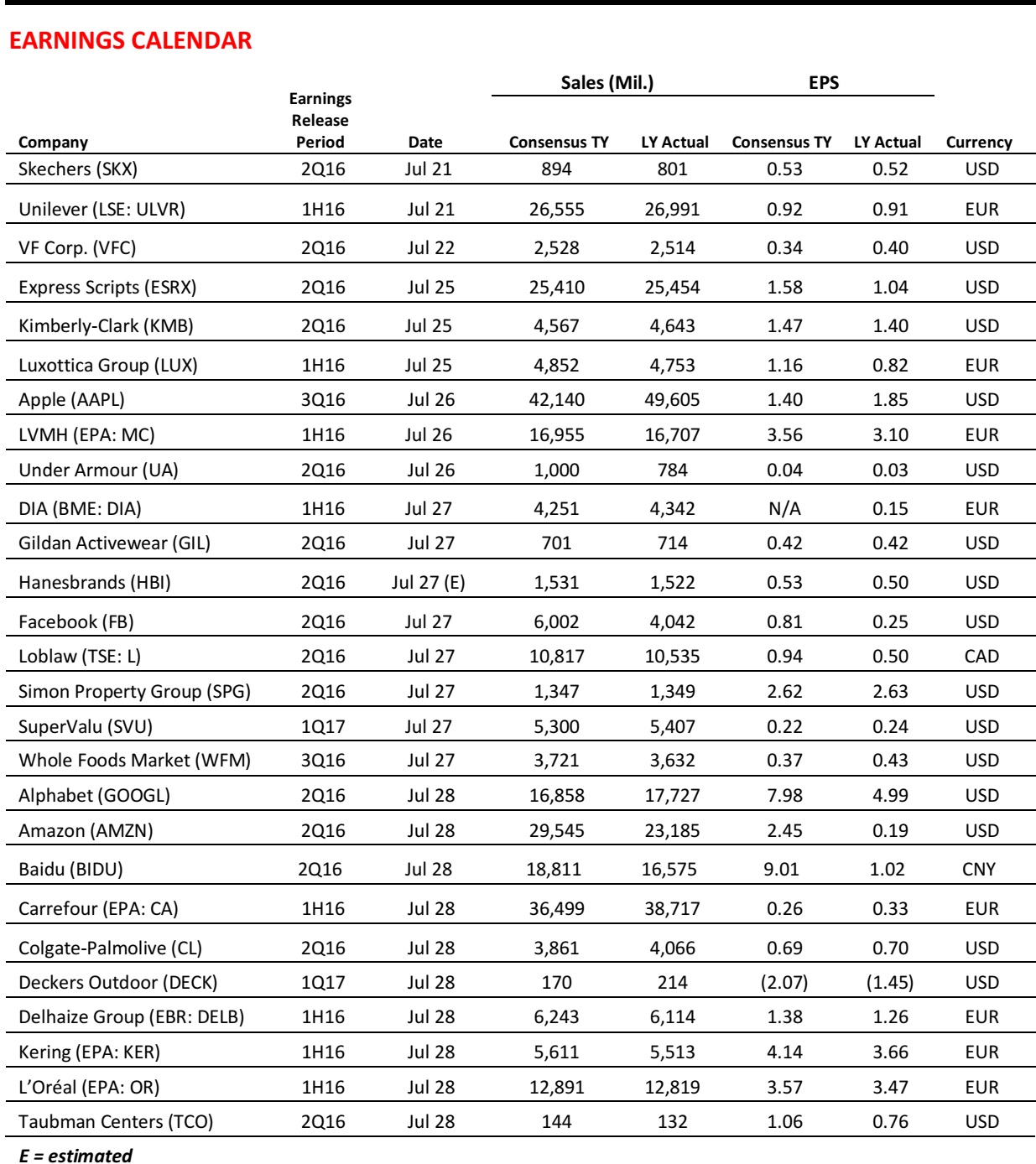
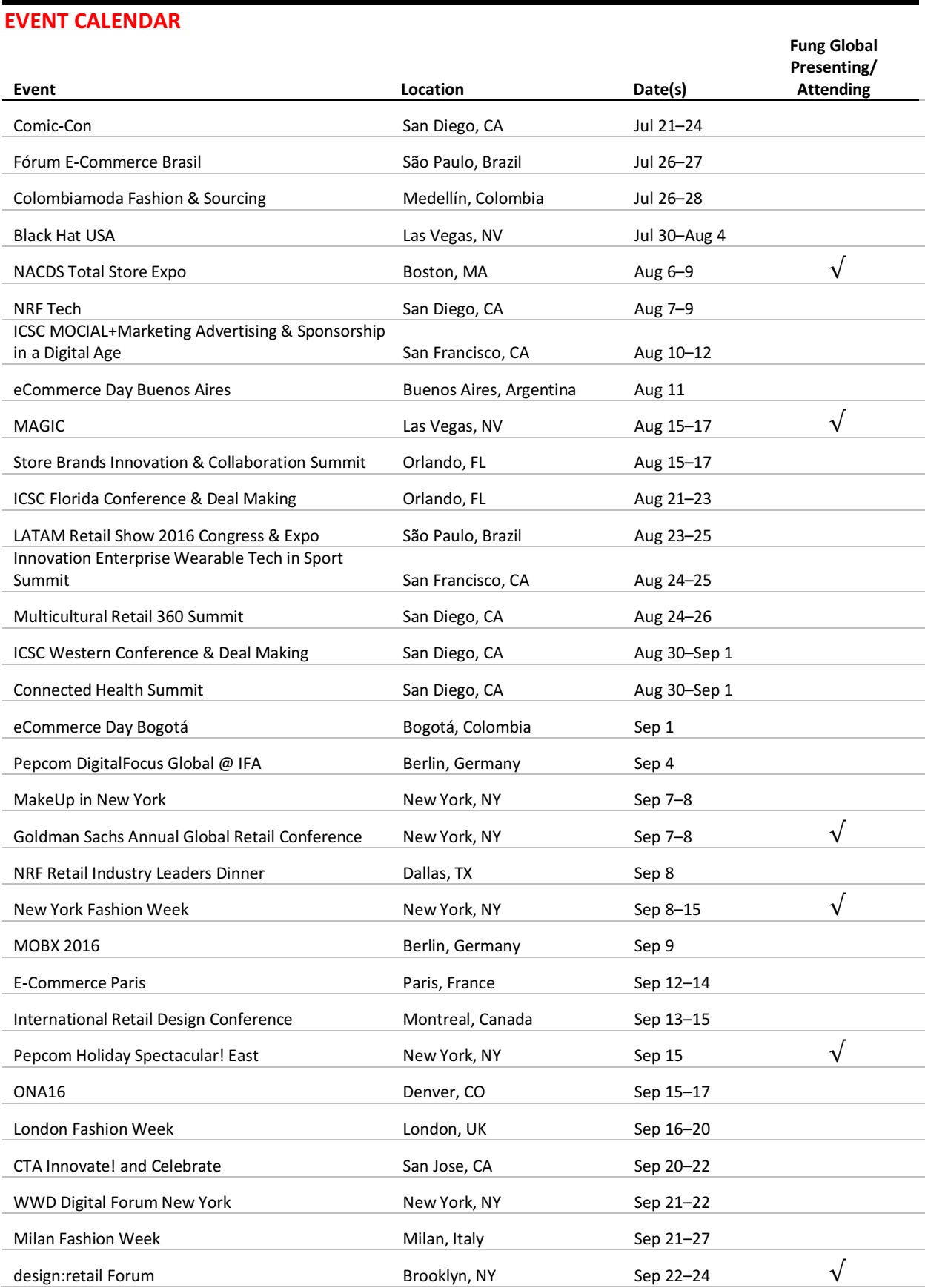


 This week, Fung Global Retail & Technology co-hosted a “Breakfast with The Disruptors” event with First Insight at the PROJECT New York conference. The event featured a panel discussion covering topics such as the millennial market, the omni-channel store shopper and the rise of customization, data analytics, retailtainment and the future of the in-store experience, and retailers in the media.
PROJECT is held twice annually in New York, in January and July, and offers a buying experience for the contemporary menswear market. The panel took place at P1VOT, a new show-floor area highlighting innovative, tech-based business solutions for designers and retailers. Fung Global Retail & Technology moderated the panel discussion, which included representatives from First Insight, John Varvatos, Mashable, Things Remembered, Resonance Companies, Body Labs and Tommy John.
The first part of the discussion centered on the importance of millennials as a demographic. One panelist suggested that the buzz regarding millennials may just be about patterns of behavior that we all go through as we grow up and into adulthood—and that these are not specific to any one generation, but life stages common to all. Another panelist suggested that we should focus our attention on Gen Z, because that generation influences more than $600 billion of commerce a year and is notable for being independent, discrete, genderless, empowered, not brand loyal and into cool brands.
The second part of the discussion centered on how successful brands use data analytics to understand and deliver customized and personalized products. One panelist spoke about microcommunities and microsegmentation, commenting that brands today have so much information about consumers that they can use it to target specific customers. For example, cart abandonment provides a wealth of information on what sizes consumers are considering buying, as well as their ages, where they live and other details. Another panelist stressed the need to understand the data, capture the insights the data point to and not become distracted by all of the tech options in the industry.
The CEO of co-host First Insight commented that data analytics are only one piece of the equation, and that retailers have to be true to the consumer in terms of balancing data with their intuition when they make business decisions. First Insight provides clients with a platform for testing new products and uses metadata to help retailers understand what will resonate with their customers.
When asked how far is too far in proactively reaching out to customers, panelists commented that we live in a personalization space and that, therefore, retailers need to ensure that customers receive messages that are personalized for them. There is a fine line between catering to customers and showing knowledge of exactly what they purchased. Customers see the value in sharing their information if it is used in a way that is personalized for them. For example, retailer John Varvatos sends out e-mail communications and then tracks how many customers visit the store the following day in order to assess which messaging best resonates with customers. One panelist specifically advised the audience to be careful to engage customers rather than push them.
The final question put to the panelists was, “What technologies are you focusing on the most?” Reponses included personalization and microsegmentation; having one view of the customer and one view of the inventory system; operational decision management, fraud control and real-time decision-making capabilities; customer segmentation, testing products and augmented reality in the store; and wearable technology.
We at Fung Global Retail & Technology were pleased to have the opportunity to co-host this informative event with First Insight and appreciate the views and insights all the panelists shared. We look forward to hosting and reporting on more “Breakfast with The Disruptors” events in the near future!
This week, Fung Global Retail & Technology co-hosted a “Breakfast with The Disruptors” event with First Insight at the PROJECT New York conference. The event featured a panel discussion covering topics such as the millennial market, the omni-channel store shopper and the rise of customization, data analytics, retailtainment and the future of the in-store experience, and retailers in the media.
PROJECT is held twice annually in New York, in January and July, and offers a buying experience for the contemporary menswear market. The panel took place at P1VOT, a new show-floor area highlighting innovative, tech-based business solutions for designers and retailers. Fung Global Retail & Technology moderated the panel discussion, which included representatives from First Insight, John Varvatos, Mashable, Things Remembered, Resonance Companies, Body Labs and Tommy John.
The first part of the discussion centered on the importance of millennials as a demographic. One panelist suggested that the buzz regarding millennials may just be about patterns of behavior that we all go through as we grow up and into adulthood—and that these are not specific to any one generation, but life stages common to all. Another panelist suggested that we should focus our attention on Gen Z, because that generation influences more than $600 billion of commerce a year and is notable for being independent, discrete, genderless, empowered, not brand loyal and into cool brands.
The second part of the discussion centered on how successful brands use data analytics to understand and deliver customized and personalized products. One panelist spoke about microcommunities and microsegmentation, commenting that brands today have so much information about consumers that they can use it to target specific customers. For example, cart abandonment provides a wealth of information on what sizes consumers are considering buying, as well as their ages, where they live and other details. Another panelist stressed the need to understand the data, capture the insights the data point to and not become distracted by all of the tech options in the industry.
The CEO of co-host First Insight commented that data analytics are only one piece of the equation, and that retailers have to be true to the consumer in terms of balancing data with their intuition when they make business decisions. First Insight provides clients with a platform for testing new products and uses metadata to help retailers understand what will resonate with their customers.
When asked how far is too far in proactively reaching out to customers, panelists commented that we live in a personalization space and that, therefore, retailers need to ensure that customers receive messages that are personalized for them. There is a fine line between catering to customers and showing knowledge of exactly what they purchased. Customers see the value in sharing their information if it is used in a way that is personalized for them. For example, retailer John Varvatos sends out e-mail communications and then tracks how many customers visit the store the following day in order to assess which messaging best resonates with customers. One panelist specifically advised the audience to be careful to engage customers rather than push them.
The final question put to the panelists was, “What technologies are you focusing on the most?” Reponses included personalization and microsegmentation; having one view of the customer and one view of the inventory system; operational decision management, fraud control and real-time decision-making capabilities; customer segmentation, testing products and augmented reality in the store; and wearable technology.
We at Fung Global Retail & Technology were pleased to have the opportunity to co-host this informative event with First Insight and appreciate the views and insights all the panelists shared. We look forward to hosting and reporting on more “Breakfast with The Disruptors” events in the near future!


 French Regulators Approve Fnac’s Takeover of Darty
(July 18) Financial Times
French Regulators Approve Fnac’s Takeover of Darty
(July 18) Financial Times

